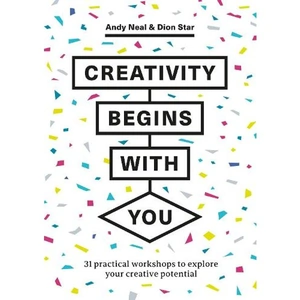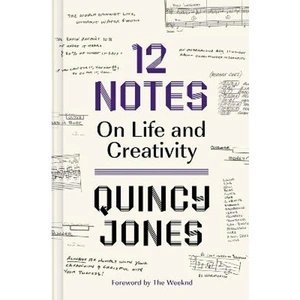Waterstones Creativity, Inc
5656 ratings

TO EXPLORE MORE
Price: £22.00
Brand: Waterstones
Description: THE EXPANDED EDITION' Just might be the best business book ever written' Forbes Magazine' This book should be required reading for any manager' Charles Duhigg' Full of detail about an interesting, intricate business' The Wall Street Journal ____ The co-founder and longtime president of Pixar updates and expands upon his 2014 New York Times bestseller on creative leadership, reflecting on the management principles used to build Pixar's singularly successful culture, including all he learned in the past nine years that allowed Pixar to retain its creative culture while continuing to evolve. For nearly twenty years, Pixar has dominated the world of animation, producing such beloved films as the Toy Story quartet, Finding Nemo, The Incredibles, Up, and WALL-E, which have gone on to set box-office records and garner thirty Academy Awards. The joyous storytelling, the inventive plots, the emotional authenticity: In some ways, Pixar movies are an object lesson in what creativity really is. As a young man, Ed Catmull had a dream: to make the first computer-animated movie. He nurtured that dream as a Ph. D. student, and then forged a partnership with George Lucas that led, indirectly, to his founding Pixar with Steve Jobs and John Lasseter. A mere nine years later, Toy Story was released, changing animation forever. The essential ingredient in that movie's success-and in the movies that followed-was the unique environment that Catmull and his colleagues built at Pixar. Creativity, Inc. Has been expanded to illuminate the continuing development of the unique culture at Pixar. Featuring a new introduction, two entirely new chapters, four new chapter postscripts, and new reflections at the end, this updated edition details how Catmull built a culture that doesn't just pay lip service to the importance of things like honesty, communication, and originality, but commits to them. Pursuing excellence isn't a one-off assignment, but an ongoing, day-in, day-out, full-time job. And Creativity, Inc. Explores how it is done. _ Readers love Creativity, Inc.' Incredibly inspirational' Great book. Wish I could give it more than 5 stars' Honestly, one of the best books I've read in a long time' Read it and read it again, then read it again and then again' Great book!! Fantastic read.
Category: Books
Merchant: Waterstones
Product ID: 9780593070093
Delivery cost: 2.99
ISBN: 9780593070093

My website utilises affiliate links when you click my 'Get the best deal now' buttons. If you buy something through one of these links, I may earn a little commission, at no extra cost to you.
I have relationships with many of the top online retailers (purchasing, shipping and returns will be handled directly by them) which enables me to offer the best deal online for the Waterstones Creativity, Inc and many other similar products - which will appear below, to enhance your online shopping experience.
For even more great deals on Waterstones Books, click the link.
Author: Charles
Rating: 5
Review: This book is written by Ed Catmull (one of the founders of Pixar), it describes the creative process Pixar uses to develop their movies. This book is broken down in to four sections 1) Getting Started While Ed was at university he was involved with high tech research funded by the American government( as a response to the Russian Sputnik program). The government just let the scientists research whatever they wanted and trusted them to do the right thing, this was highly influential on the author's belief in non hierarchical groups and trusting people to get on with their work. "The leaders of my department understood that to create a fertile laboratory, they had to assemble different kinds of thinkers and then encourage their autonomy. They had to offer feedback when needed but also had to be willing to stand back and give us room. I felt instinctively that this kind of environment was rare and worth reaching for. I knew that the most valuable thing I was taking away from the U of U was the model my teachers had provided for how to lead and inspire other creative thinkers. The question for me, then, was how to get myself into another environment like this-- or how to build one of my own." After going in to the business world, Ed found problems with the non hierarchical structure when groups got large, so he had to start introducing managers (later in the book the author states that during the filming of Toy Story the managers became a problem getting in people's way ("sand in the gears" as the author put it) and their control had to be rained in) When Pixar showed their animation Wally B at the SIGGRAPH conference the animation was not properly complete, but the audience loved it anyway because they liked the story. This taught Pixar a very important lesson, even with all their hi tech animation, story is the most important thing. Ed describes the influence of quality control techniques used by Japanese manufacturing firms had on Pixar. "Several phrases would later be coined to describe these revolutionary approaches-- phrases like "just-in-time manufacturing" or 'total quality control'-- but the essence was this: The responsibility for finding and fixing problems should be assigned to every employee, from the most senior manager to the lowliest person on the production line. If anyone at any level spotted a problem in the manufacturing process, Deming believed, they should be encouraged (and expected) to stop the assembly line. Japanese companies that implemented Deming's ideas made it easy for workers to do so: They installed a cord that anyone could pull in order to bring production to a halt. " "Before long, Japanese companies were enjoying unheard-of levels of quality, productivity, and market share. Deming's approach-- and Toyota's, too-- gave ownership of and responsibility for a product's quality to the people who were most involved in its creation. Instead of merely repeating an action, workers could suggest changes, call out problems, and-- this next element seemed particularly important to me-- feel the pride that came when they helped fix what was broken. This resulted in continuous improvement, driving out flaws and improving quality. In other words, the Japanese assembly line became a place where workers' engagement strengthened the resulting product. And that would eventually transform manufacturing around the world." Influenced by this, all workers in Pixar can suggest improvements and talk to anybody else no matter what their place in the hierarchy. Pixar believes people are more important than good ideas. "If you give a good idea to a mediocre team, they will screw it up. If you give a mediocre idea to a brilliant team, they will either fix it or throw it away and come up with something better." "Find, develop, and support good people, and they in turn will find, develop, and own good ideas. In a sense, this was related to my thinking about W. Edward Deming's work in Japan. Though Pixar didn't rely on a traditional assembly line-- that is, with conveyor belts connecting each work station-- the making of a film happened in order, with each team passing the product, or idea, off to the next, who pushed it further down the line . " "To ensure quality , I believed, any person on any team needed to be able to identify a problem and, in effect, pull the cord to stop the line. To create a culture in which this was possible, you needed more than a cord within easy reach. You needed to show your people that you meant it when you said that while efficiency was a goal, quality was the goal. More and more, I saw that by putting people first-- not just saying that we did, but proving that we did by the actions we took-- we were protecting that culture." Toy Story 2 was as big problem for Pixar and had to be radically altered at very short notice, employees had to work very long hours exhausting them. "On the most basic level, Toy Story 2 was a wakeup call. Going forward, the needs of a movie could never again outweigh the needs of our people. We needed to do more to keep them healthy. As soon as we wrapped the film, we set about addressing the needs of our injured, stressed-out employees and coming up with strategies to prevent future deadline pressures from hurting our workers again. These strategies went beyond ergonomically designed workstations, yoga classes, and physical therapy. Toy Story 2 was a case study in how something that is usually considered a plus-- a motivated, workaholic workforce pulling together to make a deadline-- could destroy itself if left unchecked. Though I was immensely proud of what we had accomplished, I vowed that we would never make a film that way again." 2) Protecting the New The need for feedback from others is considered very important at Pixar, not taking personal offense when your ideas are criticised is vital. "There is no doubt that our decision-making is better if we are able to draw on the collective knowledge and unvarnished opinions of the group. But as valuable as the information is that comes from honesty and as loudly as we proclaim its importance, our own fears and instincts for self-preservation often cause us to hold back. To address this reality, we need to free ourselves of honesty's baggage. " "One way to do that is to replace the word honesty with another word that has a similar meaning but fewer moral connotations: candor. Candor is forthrightness or frankness-- not so different from honesty, really. And yet, in common usage, the word communicates not just truth-telling but a lack of reserve. Everyone knows that sometimes, being reserved is healthy, even necessary for survival. Nobody thinks that being less than candid makes you a bad person (while no one wants to be called dishonest). People have an easier time talking about their level of candor because they don't think they will be punished for admitting that they sometimes hold their tongues. This is essential. You cannot address the obstacles to candor until people feel free to say that they exist (and using the word honesty only makes it harder to talk about those barriers)." "Of course, there are sometimes legitimate reasons not to be candid. Politicians, for example, can pay a steep price for speaking too bluntly about contentious issues. CEOs can get dinged for being too open with the press or with shareholders, and they certainly don't want competitors to know their plans. I will be less than candid at work if it means not embarrassing or offending someone or in any number of situations where choosing my words carefully feels like the smart strategy. But that's not to say lack of candor should be celebrated. A hallmark of a healthy creative culture is that its people feel free to share ideas, opinions, and criticisms. Lack of candor, if unchecked, ultimately leads to dysfunctional environments." The importance of not being afraid to makes mistakes is covered. "Pete and his crew never believed that a failed approach meant that they had failed. Instead, they saw that each idea led them a bit closer to finding the better option. And that allowed them to come to work each day engaged and excited, even while in the midst of confusion. This is key: When experimentation is seen as necessary and productive , not as a frustrating waste of time, people will enjoy their work-- even when it is confounding them. " "The principle I'm describing here-- iterative trial and error --has long-recognized value in science. When scientists have a question, they construct hypotheses, test them, analyze them, and draw conclusions-- and then they do it all over again. The reasoning behind this is simple: Experiments are fact-finding missions that, over time, inch scientists toward greater understanding. That means any outcome is a good outcome , because it yields new information. If your experiment proved your initial theory wrong, better to know it sooner rather than later. Armed with new facts, you can then reframe whatever question you're asking." As a business grows its employs more people and those people need work to do, it becomes the hungry beast that needs work to feed it, it is easy to copy other peoples' ideas to create movies to feed the beast, but this creates mediocre films. The author states that all Pixar movies start out bad, they are ugly babies, they need time to grow, for the story to be rewritten and rewritten, slowing getting better and better over time until it's ready, while this happens the ugly baby needs to be protected from the hungry beast. The fact that change and randomness are a part of life and need to be embraced in the creative process is covered. "What stands in our way are these hidden barriers-- the misconceptions and assumptions that impede us without our knowing it. The issue of what is hidden , then, is not just an abstraction to be bandied about as an intellectual exercise. The Hidden-- and our acknowledgement of it-- is an absolutely essential part of r
Author: Peter - The Reading Desk
Rating: 4
Review: This is the story of Pixar and its founders Steve Jobs, John Lasseter and Ed Catmull. The story tracks the creation of Toy Story and the creation of the worlds first computer-generated animation film. Following the first showing, their hearts dropped. They had achieved a wonderful feat of technical advances and graphical breakthroughs but there was one vital piece missing. There was no story or characters that viewers could empathise with, laugh with, cry with or root for. They needed a storyteller! Toy Story became a huge success and then the next era begins!!! It's always an interesting read to appreciate the challenges and highlights entrepreneurs face in establishing new companies. What is insightful in this book is to explore what happens after success in terms of motivation, pressures to deliver again and renewed creativity challenges. How teams react to stepping up into the fray again. Are you a one trick pony? Very interesting read and a unique perspective from a unique company.












